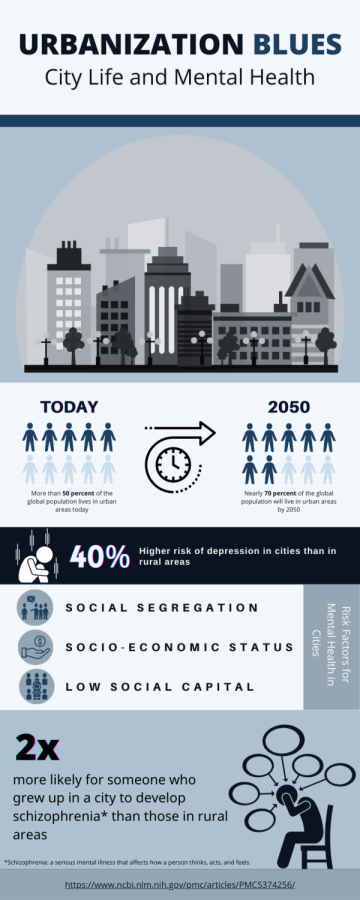Cracks in the Urban Dream
May 29, 2023
Big cities have a constant hustle and bustle atmosphere, complete with crowded sidewalks and streets congested with vehicles. American author Patricia Marx sums it up well in her piece “Buy Shanghai!” in the New Yorker: “New York may be the city that never sleeps, but Shanghai doesn’t even sit down, and not just because there is no room.”
In modern media, the liveliness of cities is often romanticized as the dream destination for protagonists. Cities are shown as a land of opportunity — a fantastical world where anything is possible.

However, the media fails to portray the toll that the restlessness of cities takes on a city dweller’s mental health, creating a sense of ignorance towards the drawbacks of urban living. The busy lifestyle of cities can quickly become a stressful environment for visitors and residents alike.
“In general, we find that people living in cities have more mental health risks and have the highest anxiety levels. People living in suburban areas have the lowest levels, and then rural is somewhere in between,” said Dr. Ross Avilla, a professor of psychology at the University of California, Merced. Avilla also holds a doctorate in psychology from the University of California, Davis.
Additionally, according to a study published in the National Library of Medicine, urban air, water, and noise pollution significantly affects the mental health of urbanites. For instance, increased vicinity to major streets or airports elevates exposure to traffic noise and pollution and is linked to higher levels of anxiety and aggression.
“Between being overstimulated, pollution, and noise, we know people in cities have difficulty sleeping. There are much higher rates of insomnia in cities because the lights constantly shine in your window, and you’re always hearing traffic outside,” Avilla said.
The constant light exposure in urban cities confuses the day-night system in the human body — called the circadian rhythm — and changes sleeping patterns. Irregular sleep habits can negatively affect one’s mood and contribute to numerous health problems, including depression and anxiety.
Furthermore, city residents are more likely to feel a profound sense of loneliness than those living in suburban or rural areas.
“It’s ironic that urban residents have more people around them but typically experience more loneliness because they spend less time with people they have a good connection with, like family and friends. They are much less likely to be around relatives because most of them move away from family to live in a city,” Avilla said.
The lack of social support in cities also contributes to the social alienation urbanites feel. A robust support system nearby is crucial to maintaining a healthy mental life, so city residents are often disadvantaged.
It’s this process where you feel down, so you don’t feel like going out and socializing, which makes you feel even worse, creating a spiral people get caught in. — Dr. Ross Avilla
“You would hope that when people are lonely and feeling overwhelmed, they will cultivate more supportive social networks, but it can be hard. It’s this process where you feel down, so you don’t feel like going out and socializing, which makes you feel even worse, creating a spiral people get caught in,” Avilla said.
Moreover, being in crowded situations is naturally anxiety-inducing because of the increased stimuli the brain has to process; due to the populous nature of cities, urbanites are more likely to experience social anxiety than others. In fact, urban residents are 21 percent more likely than rural residents to have anxiety disorders.
“People in cities have more social interactions, but they’re typically more superficial and stressful. City residents are usually forced to interact with strangers on a daily basis, which can be difficult for some” Avilla said.
Popular media usually does not show urbanization’s toll on visitors and residents, so many are unaware of the silent mental health epidemic occurring in the world’s big cities. From insomnia to depression, urbanization is undermining the quality of daily life.
